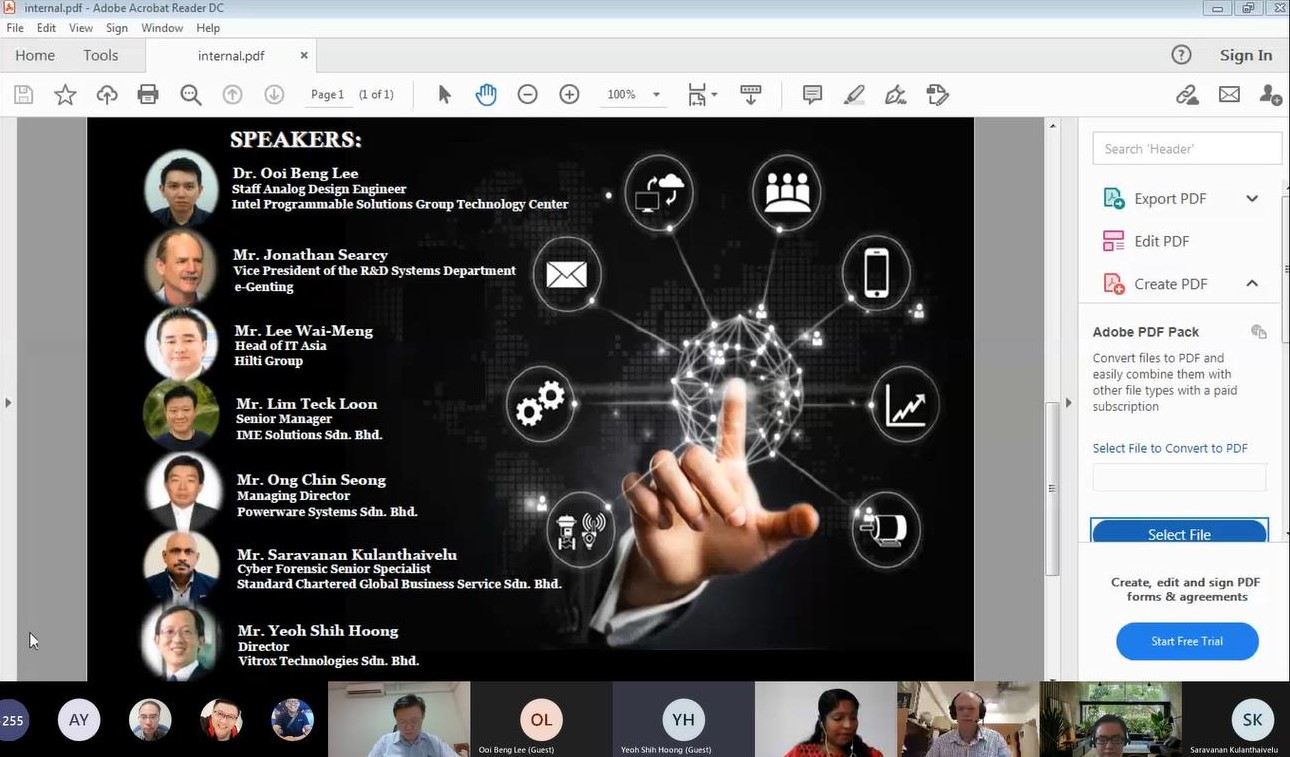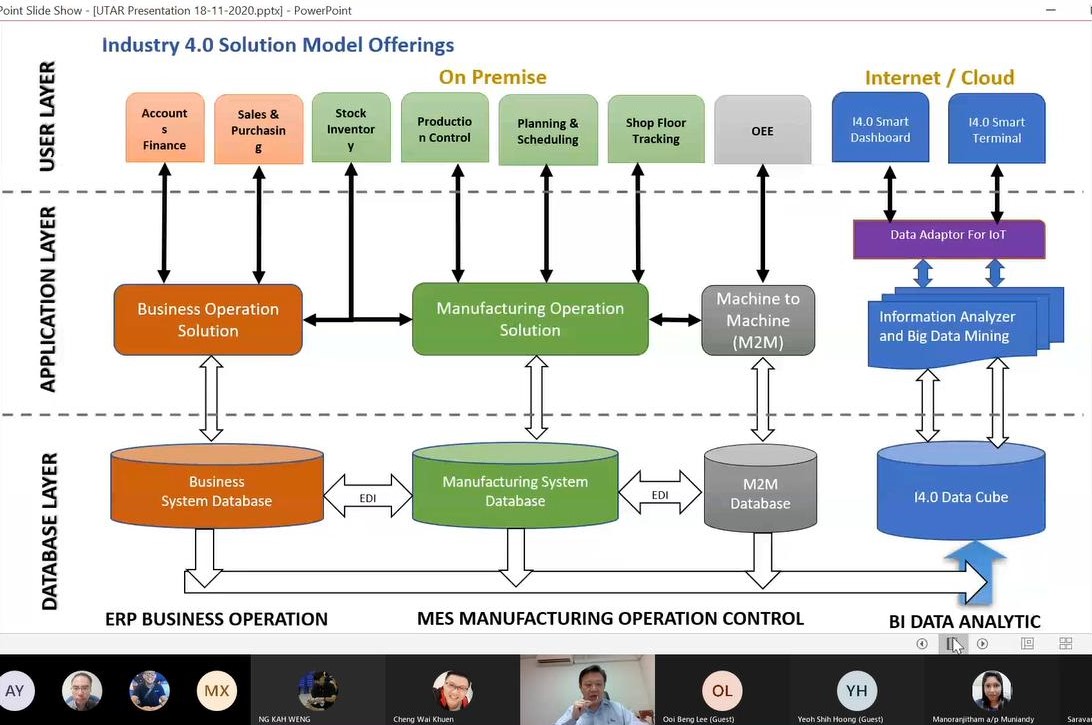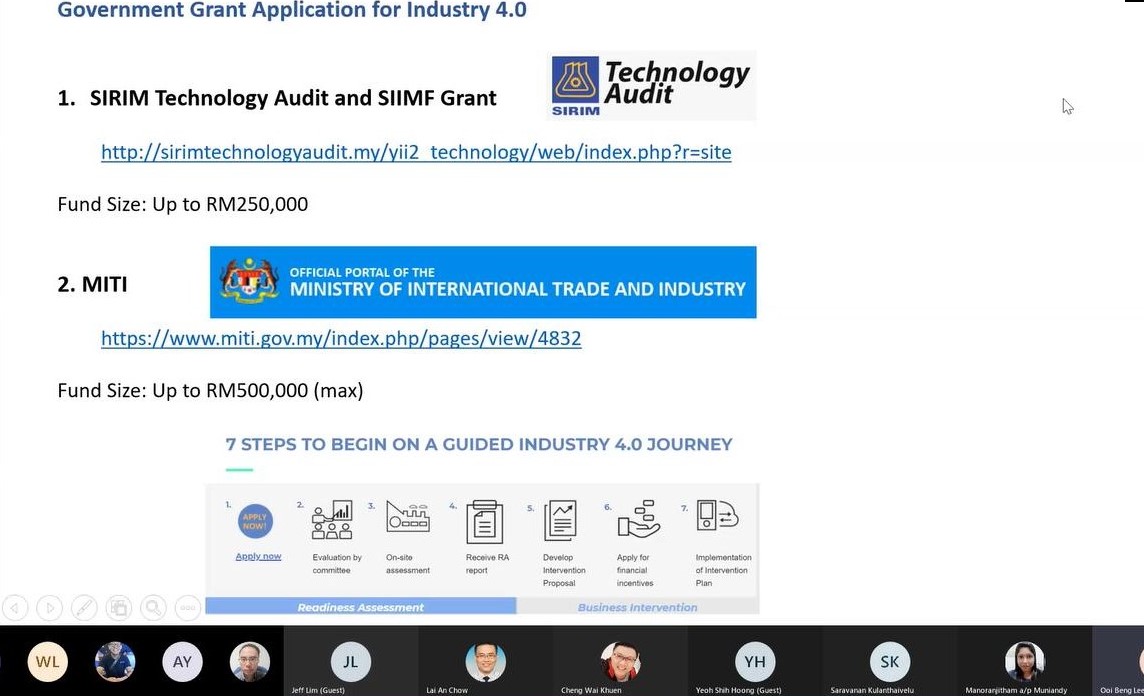
Fast-tracking of digital transformation in Malaysia during the Covid-19 pandemic
Aimed at educating the students and staff on how technology plays a vital role in Malaysia’s digital transformation, UTAR Faculty of Information and Communication Technology (FICT) via its annual Industry Advisory Panel (IAP) Forum, organised another successful forum titled “How COVID-19 Pandemic is Fast-Tracking Digital Transformation in Malaysia” on 18 November 2020 via Microsoft Teams.
Held for the first time via a virtual platform, the forum invited a total of six panellists, namely Staff Analog Design Engineer of Intel Programmable Solutions Group Technology Center Dr Ooi Beng Lee, Vice President of R&D Systems Department e-Genting Jonathan Searcy, Global Head of Digital Workplace Service of Hilti Group Lee Wai-Meng, Senior Manager of IME Solutions Sdn Bhd Lim Teck Loon, Cyber Forensic Senior Specialist Standard Chartered Global Business Service Sdn Bhd Saravanan Kulanthaivelu and Director of ViTrox Technologies Sdn Bhd Yeoh Shih Hoong.
Held yearly, the forum kicked off with a short introductory and welcome message by the moderator of the forum, a lecturer from FICT Dr M. Manoranjitham. She enlightened, “As we all are aware of, the Covid-19 pandemic is, first and foremost, a health crisis that has caused many changes since the beginning of the year 2020. Many countries implemented movement control order (MCO) which created severe short-term disruption worldwide. It is also an undeniable fact that this disruption had forced the companies to fast track their digital transformation to accommodate and to survive through the crisis period.”
This year’s forum highlighted how the global pandemic Covid-19 has forced and transformed businesses to speed up their digital transformation. The forum also aimed to discuss the aspects of digital transformation that Malaysia has gone through until today and what are the challenges faced by the business and where does Malaysia stand right now in driving digital transformation.
To survive the new normal during the pandemic, Jonathan got the ball rolling by saying, “Overall, the Covid-19 pandemic has changed the entire global business ecosystems and they have been upended and certainly new technologies and innovations are playing crucial roles during the times of crisis.” “The Covid-19 pandemic has spurred technology innovation and adoption, the rise in contactless technology, and changes in the business world,” added Jonathan, a guru in gaming systems who has enormous expertise and experience worth easily more than 35 years.
Next in the line was Saravanan who added his views for the question “What are the five most apparent transformations that could be seen in Malaysia?”. He said, “There has been a notable big trend of transformation during the Covid-19 pandemic, among them was the use of video conferencing tools. Video conferencing is nothing new, however, for the last couple of months, video conferencing tools have transformed from an optional tool to one that is essential, helping to keep businesses running as much of the world’s workforce works from home.” Saravanan, who is an expert in forensic services and advisories, focusing on financial fraud and threat actor activities, added, “There are lots of great video conferencing tools available, many of which are helpfully built-in to our everyday devices. Among the most picked-up video conferencing tool during the ongoing pandemic is ZOOM.”
On the other hand, Dr Ooi enlightened the participants about remote employees’ expense reimbursement programme. He explained, “As the Covid-19 pandemic hit, many employees from all over the world started working virtually from home. In line with this move, many employers have now offered to reimburse remote employees’ work-related expenses such as laptops, printers and other office supplies. With this move, more workers will continue working from home on a permanent basis even after the crisis is over.” Dr Ooi who has vast experience in the Field Programmable Gate Arrays (FPGA) and who has also contributed in many top-notch journals and conferences, added, “There are signs both employers and employees are adjusting to the new normal of remote work. This is evident when more and more companies announce plans to expand or extend remote working arrangements for their employees.”
Moving on to the second question, “What are the five biggest challenges for digital transformation in Malaysia?”, Lim continued the forum by explaining how to deliver digital experiences to customers and employers. He said, “Computers have evolved and advanced significantly over the decades since they originated. Many years ago, in their most fundamental form, computers were very large and slow. Gradually, computers have become smaller and faster, enabling people to use them virtually anywhere. Today, we carry more computing power on our smartphones than was available in the early days. Computing continues to change our world. It shapes how objects are designed, what information we receive, how and where we work, and who we meet and do business with. And computing changes our understanding of the world around us and the universe beyond.”
The forum also saw Yeoh and Lee speaking on issues such as data privacy and security concern, lack of budget and resources in implementing technologies, lack of economic growth, lack of the right in-house skills sets and expertise, for example, big data analytics, technologies, and business skills, regulation or legislative changes and etc. The forum also described how digital transformation index has been used as a benchmark to indicate the status of digital transformation and performance of businesses.
In conclusion, Dr Manoranjitham concluded, “Digital transformation is not easy. Even though 80% of the businesses have claimed to experience digital transformation, in reality only 41% have really focused on transforming all or at least most of the areas. According to a recent survey performed by Dell Technologies, about 94% of businesses are facing entrenched barriers spanning across technology, people and policy.”
The forum was attended by more than 250 participants virtually. Also present at the forum were Dean of FICT Assoc Prof Ts Dr Liew Soung Yue and Deputy Dean for Academic Development and Undergraduate Programmes Ts Dr Cheng Wai Khuen.



The list of speakers and some of the slides shared by the speakers during the forum
![]()
© 2020 UNIVERSITI TUNKU ABDUL RAHMAN DU012(A).
Wholly owned by UTAR Education Foundation Co. No. 578227-M LEGAL STATEMENT TERM OF USAGE PRIVACY NOTICE